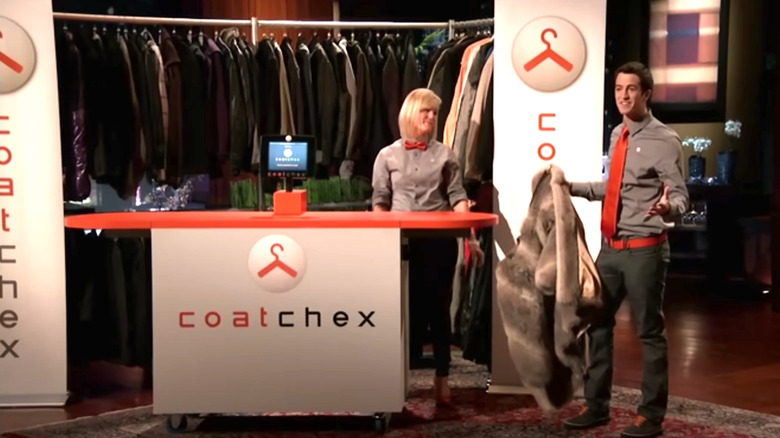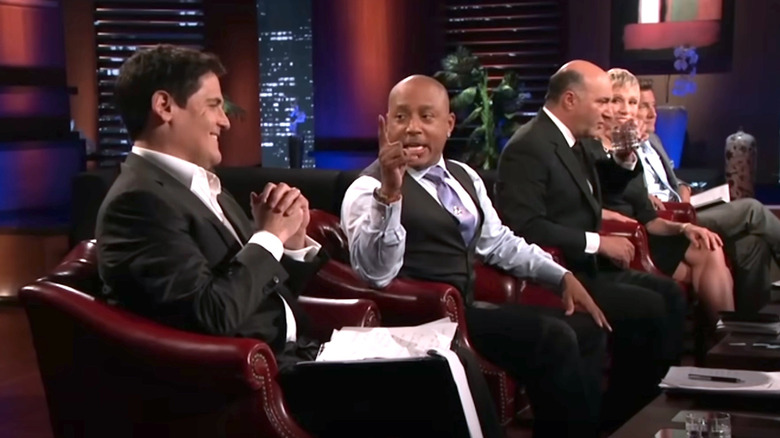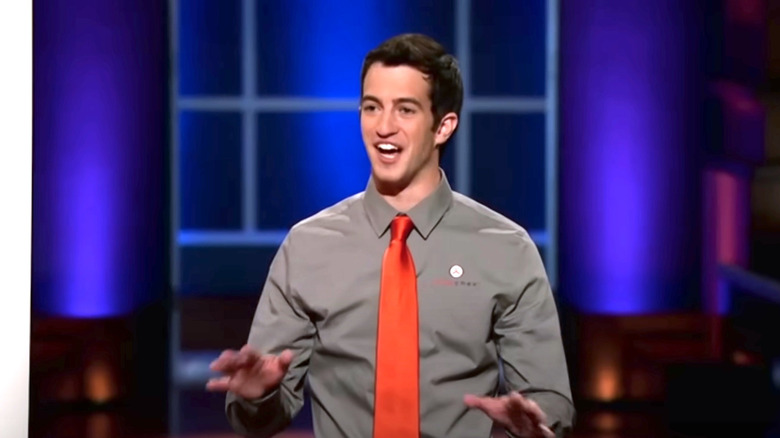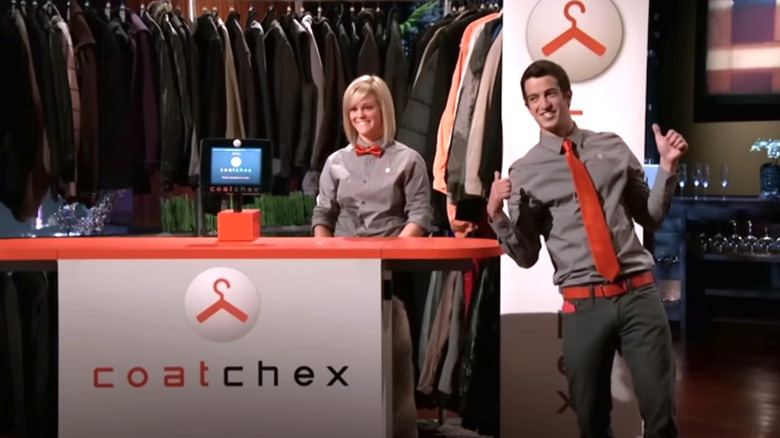What Happened To CoatChex From Shark Tank Season 4?
It takes a certain mix of showmanship and knowledge to close a deal on ABC's hit reality series "Shark Tank." But if you're a regular viewer of the series, you know even the smoothest talking know-it-alls are often seen exiting the soundstage with nothing to show for their efforts other than a bit of primetime exposure and an earful of "I'm out." So often is that famed phrase of rejections uttered by the billionaire panelists on "Shark Tank," it's a wonder anyone ever makes a deal.
But even as rare as it is for a Shark to put their money behind a fledgling company, it's even rarer for one of the would-be entrepreneurs to actually pass on a deal. That does happen sometimes, of course, and "Shark Tank" fans who tuned into the series' fourth season premiere might be quick to point out that few of those passes were quite as surprising as the one delivered by Derek Pacqué, who stepped into the studio to pitch an automated coat check system he'd cleverly named CoatChex.
That's because Pacqué made his "Shark Tank" pitch just out of college, and was pitching a product that was virtually untested in any real-world environment. Moreover, Pacqué himself seemed woefully unprepared for his appearance after his initial pitch. He did fare better than the young inventor of Season 9's Savy shopping app, however, piquing interest enough over his product that offers were indeed made. Here's what happened to CoatChex after its primetime debut.
What happened to CoatChex on Shark Tank?
After a sizzle of real details about Derek Pacqué's post-graduate pedigree, the young entrepreneur explained how the inspiration for CoatChex came to him amid some dodgy coat check mishaps at local college bars. He later pitched the idea to his then-college professor, who promptly jumped on board as a partner, and helped him develop both the product and business plan being pitched.
The Sharks were, however, quick to point out that Pacqué's business plan for CoatChex was suspect at best, with soon-to-exit panelist Mark Cuban outright calling it "horrible." The panelists were equally suspicious of the CoatChex founder's ask, as the $200,000 requested for 10% equity translated to a $2 million valuation despite the fact that Pacqué had not sold a single unit of his automated coat check system. Those facts alone produced a rapid "I'm out" from three of the panelists. Though Robert Herjavec couldn't justify the buy-in, the Codi Storytelling Robot investor still showed interest. After requesting a modified offer from Pacqué, the revised numbers were still not tempting enough.
To the shock of his co-stars, Cuban was very much in, but not at Pacqué's asking price. Instead, the Shark offered the $200,000 for a 33% stake in CoatChex, believing his expertise and connections in the tech realm were worth the increase in equity. Pacqué liked the deal and took the offer to his former professor via phone. To the disbelief of the panelists, Pacqué ultimately rejected the offer, believing 33% was too much to give. Cuban then pointedly rejected Pacqué's half-hearted 20% counter, leaving CoatChex without a deal.
What happened to CoatChex after Shark Tank?
Despite the chiding of Mark Cuban's "Shark Tank" co-stars, it's easy to see why he was interested in CoatChex, as Derek Pacqué had hit on a potentially lucrative concept. As Pacqué noted, the tech could even be scaled beyond coat check applications for use by any number of bailment services. As for the money, Pacqué sought to sell CoatChex devices — which cleverly match the checked item to its owner via photograph and offer onboard payment options via an easy-to-navigate tablet application — at a set price, then keep approximately 15% of each sale thereafter for use of the platform.
Depending on the location, the dollars and cents could clearly add up quickly, which is no doubt why Pacqué and his partner were hesitant to give up a 33% stake in the company despite their product being almost completely untested. The CoatChex duo was apparently wise to bet on themselves, as they've had considerable success since the 2012 airing of the "Shark Tank" episode in question. In fact, these days they're touting CoatChex as a multi-million dollar tech company that continues to grow its presence in concert venues, sporting arenas, museums, and nightclubs the world over.
Of course, the company is no longer called CoatChex, as Pacqué pivoted to Chexology sometime after the "Shark Tank" appearance. The name change no doubt resulted from the company's planned pivot into other hospitality arenas, including luggage and package storage, valet services, hotel bell desks, and various rental platforms, all of which have grown the company in ways even Pacqué might not have anticipated.
What does the future hold for CoatChex and its founder?
While Derek Pacqué's CoatChex concept no doubt owes a debt to its profile-raising appearance on "Shark Tank," it's safe to say the entrepreneur and his partners have largely built the company into what it is on their own. That is a rarity for most of the companies that leave the "Shark Tank" soundstage without an investment deal in place, and a case could be made that CoatChex — and in turn Chexology — now ranks among the more legit success stories from the series' ongoing primetime run.
The same is obviously true for Pacqué, who's come a long way indeed since a missing coat inspired the then-college student to start Hoosier CoatCheck. Pacqué's LinkedIn page currently touts the entrepreneur as the Founder and CEO of Chexology, and it would seem he is content enough to continue guiding the Chexology ship for the time being, as he has no other business ventures listed there.
It's hard to argue that approach, as Pacqué has built an impressive little empire in the hospitality and bailment arena. These days, you can reportedly even find some version of Chexology in use at venues like New York's Museum of Modern Art, the Barclay's Center, Circa Las Vegas, and several Sheraton hotels, among many other locations. It is not, however, entirely clear what the future holds for Chexology, apart from continuing to build and bolster relationships with hospitality-focused businesses. But given the vast range of businesses that occupy that particular sector, there should still be plenty of room for Chexology to grow.



